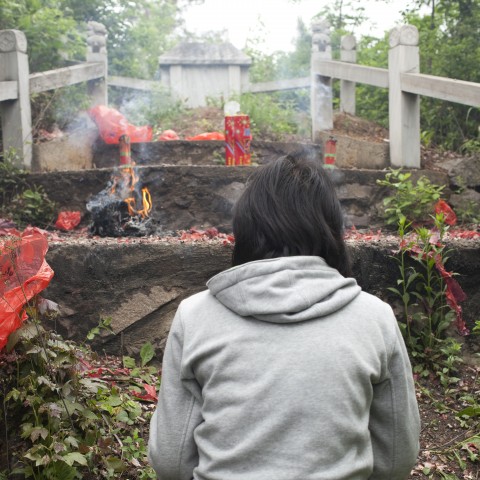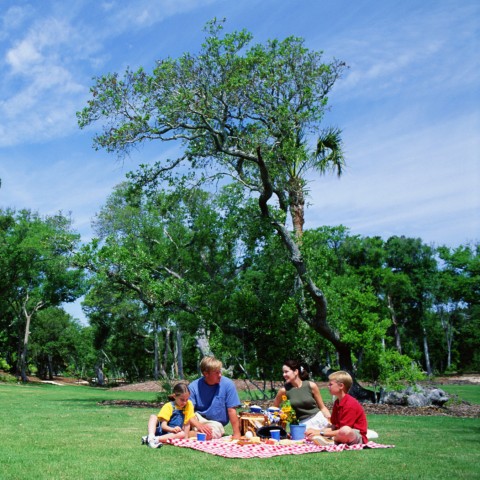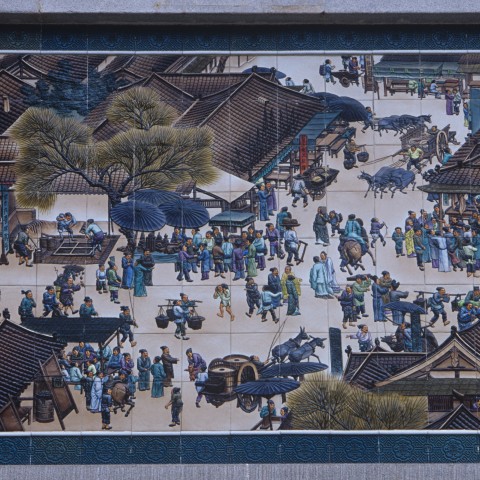Tomb Sweeping Day (or the Ching Ming Festival) in Hong Kong, is a day of great importance to HongKongers. This is because it’s the day on which they fulfill their duties of filial piety by honoring deceased family and ancestors according to tradition.
CantoneseClass101.com hopes to give you a better understanding of the Ching Ming Festival in Hong Kong, and to give you a good idea of Tomb Sweeping Day’s meaning. In learning about this significant aspect of Hong Kong culture, you’re not only immersing yourself in the country of your target language, but you’re allowing yourself to find more purpose in your language-learning journey.
Let’s begin by answering the following question: “What is Tomb Sweeping Day?”
1. What is the Ching Ming Festival?
Each year in Hong Kong, the Ching Ming Festival—also known as Tomb Sweeping Day—is celebrated. This is the day when HongKongers pay respect to their deceased family members and honor their duties of filial piety. This means traveling (sometimes long distances) to clean up their grave sites and burn papier-mâché and joss money there.
2. When is Tomb Sweeping Day?
Each year, the Ching Ming Festival is typically celebrated on April 4 or 5, though sometimes it takes place on April 6. Though the date doesn’t vary too much from year to year, we’ll still provide you with an outline of this holiday’s date for the next ten years:
- 2019: April 5
- 2020: April 4
- 2021: April 4
- 2022: April 5
- 2023: April 5
- 2024: April 4
- 2025: April 4
- 2026: April 6
- 2027: April 5
- 2028: April 4
3. Reading Practice: How is the Ching Ming Festival Celebrated?
How is Tomb Sweeping Day in Hong Kong celebrated? Read the Cantonese text below to find out, and to learn some Ching Ming Festival facts. (You can find the English translation directly below it.)
—
清明節的傳統活動是拜山、掃墓和祭祖;即是到祖先墓碑前上香、除雜草、燒紙錢及紙紮祭品,一盡孝道。而且適逢春天開始,所以拜山之後,有些家庭也會乘機去郊遊,呼吸新鮮空氣。有些家庭,會提早幾天甚至幾星期去拜山,避免人多擠迫。所以拜山掃墓的傳統並不限於清明節當日。
在清明節用的紙紮祭品是一些燒給先人,仿造日常產品的紙製物品,後人希望能傳達到陰間的祖先,讓他們在那裡也能夠生活豐裕。紙紮祭品店的商品款式多不勝數,有房車、別墅、傭人、遊艇、遊戲機、手提電話、護膚品、寵物等,所有我們會用的東西都有一個紙製的版本。體積小的物品都會以一比一的尺寸製造,而大體積的物品就會造成一個比較細的尺寸,方便運送。
拜山時最常用的花是菊花。因為菊花含有思、懷念的意思,其中白色的菊花更代表對逝去者的尊敬,所以清明節大部分人都在墳前獻上菊花來表示悼念故人。
—
The traditional activity of the Ching Ming Festival is to visit, clean, and pay our respects at our ancestors’ graves. It means to carry out filial piety by burning incense, weeding, and burning joss money and papier-mâché offerings in front of the tombstones. As spring starts around the same time, some families take the opportunity to go on an outing and get some fresh air. Some families will visit the ancestors’ graves a few days or even weeks earlier to avoid the crowd, so generally speaking the customs are not limited to Ching Ming Day only.
The papier-mâché offerings we burn during the Ching Ming Festival are papier-mâché models in the shape of daily-use items; descendants send these items to their ancestors in the underworld by burning them, hoping that the ancestors will have an affluent lifestyle in the afterlife.The papier-mâché stores offer countless types of items, fancy cars, villas, servants, yachts, game consoles, mobile phones, pets, and so on. Everything that we use comes in a papier-mâché version for the deceased. Small items are usually in 1-1 size, but bigger items are usually made at a smaller scale for easier delivery.
The most common flower used to pay respect to the deceased is chrysanthemum. That’s because chrysanthemum represents yearning and longing, especially the white chrysanthemum, which is used in memorial ceremonies. Therefore most people bring chrysanthemums to the graveyards on Ching Ming Festival.
4. Additional Information
One of the most common Ching Ming Festival foods is sweetened green rice balls, which are made in advance so as to keep the actual holiday free for the traditional activities.
There is another common phenomenon on Ching Ming Festival: wildfire. While paying respect to the deceased, some people have accidentally left fires burning, or have not used metal buckets to burn joss money and products. Wildfires started by human negligence like this have burned down a lot of trees and wildlife. Of course, this attracts a lot of public attention every year, so the government has set up laws to regulate it and raise the public’s awareness of fire safety.
There is a very famous poem by Du Mu about the festival:
Drizzling rain falls on Ching Ming days.
The mourners’ hearts are broken.
Where can a wine-house be found to drown one’s sorrow?
A cowherd points to Almond Flower Village in the distance.
5. Must-know Vocab
Here’s some vocabulary you should know for the Ching Ming Festival!
- 祖先 (zou2 sin1) — ancestor
- 清明節 (cing1 ming4 zit3) — Qingming Festival
- 野餐 (je5 caan1) — picnic
- 白切雞 (baak6 cit3 gai1) — white sliced chicken
- 掃墓 (sou3 mou6) — pay respects to a dead person at his tomb
- 祭祖 (zai3 zou2) — pay respect to deceased ancestors
- 香燭 (hoeng1 zuk1) — joss stick
- 陰司紙 (jam1 si1 zi2) — Joss paper
- 孝道 (haau3 dou6) — filial piety
- 杜牧 (dou6 muk6) — Du Mu
- 拜山 (baai3 saan1) — commemorate a dead person at his grave
To hear each word pronounced, check out our Ching Ming Festival vocabulary list. Here, you’ll find each word accompanied by an audio of its pronunciation.
Conclusion
What do you think about the Tomb Sweeping Festival in Hong Kong? Is there a holiday in your country for honoring the deceased? Let us know in the comments!
We hope that you enjoyed learning about the Ching Ming Festival with us. For more information on Cantonese culture and the Cantonese language, visit us at CantoneseClass101.com. We offer an array of insightful blog posts, free vocabulary lists, and an online community to discuss lessons with fellow Cantonese learners. You can also upgrade to Premium Plus to take advantage of a one-on-one learning experience with our MyTeacher program!
In the meantime, keep up your hard work! Know that learning about a country’s culture can be exciting, and is a great way to enrich your language skills. All your hard work, studying, and practice will pay off!













